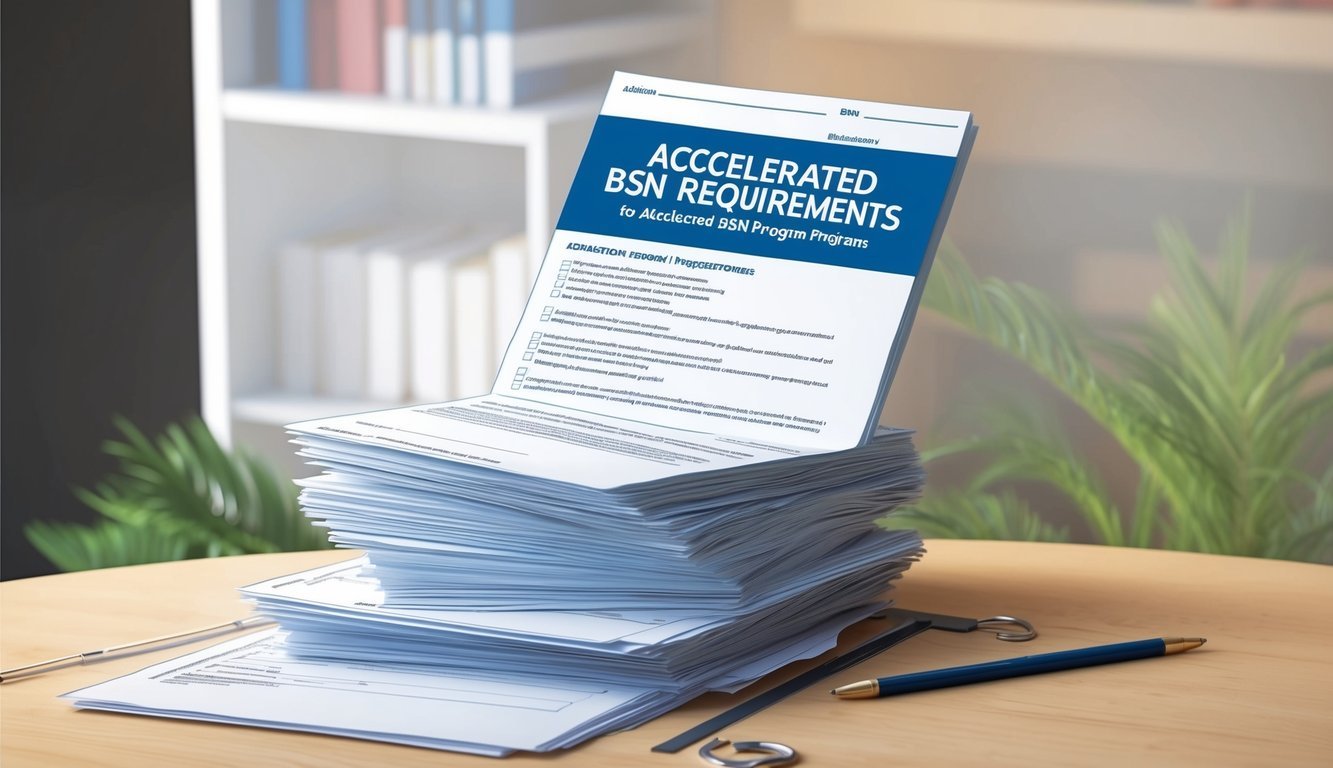Accelerated BSN programs in California offer a pathway for individuals looking to quickly transition into the nursing field.
These programs typically allow students with a bachelor’s degree in another discipline to earn their Bachelor of Science in Nursing in a condensed timeframe, often within 12 to 18 months.
The growing demand for qualified nurses makes enrolling in an accelerated BSN program a great choice.
It sets you on a fast track to a rewarding nursing career.
Many California institutions, such as California State University-Los Angeles and California State University-Fullerton, offer robust ABSN programs.
This not only enhances your educational experience but also provides essential clinical training opportunities.
You can expect a rigorous curriculum that prepares you for the NCLEX-RN exam, allowing you to become a licensed registered nurse efficiently.
Exploring Accelerated BSN Programs in California
Accelerated Bachelor of Science in Nursing (ABSN) programs in California offer a unique opportunity for individuals to transition into nursing careers swiftly.
These programs cater to those who already hold a bachelor’s degree in another field, allowing them to earn their BSN in a shorter timeframe, typically ranging from 12 to 18 months.
Overview of Accelerated BSN (ABSN)
ABSN programs are designed specifically for students who possess a non-nursing undergraduate degree.
The intense curriculum focuses on both theoretical and practical nursing skills.
You will engage in coursework that covers essential nursing topics, clinical practices, and hands-on training.
These programs emphasize critical thinking, patient care, and clinical decision-making.
Completion of an ABSN program positions you to take the NCLEX-RN exam, crucial for obtaining your nursing license.
The programs are accredited and often aligned with the needs of local healthcare facilities.
Key Features of ABSN Programs
ABSN programs in California share several distinct features.
Typically, they include:
- Duration: Most programs can be completed in 12 to 18 months, providing a fast-track option for aspiring nurses.
- Clinical Rotations: Hands-on experiences in diverse healthcare settings to enhance practical skills.
- Flexible Formats: Some programs offer evening or weekend classes to accommodate working professionals.
Additionally, many institutions provide resources such as career services, advising, and peer support.
This ensures you have the necessary guidance throughout your educational journey.
Examples of ABSN Programs in California
Here are notable institutions offering ABSN programs:
| University | Duration | Location | Additional Highlights |
|---|---|---|---|
| San Francisco State University | 15 months | San Francisco, CA | Located near various healthcare facilities. |
| Mount Saint Mary’s University | 15 months | Los Angeles, CA | Focused on community service and patient-centered care. |
| California State University San Marcos | 12-15 months | San Marcos, CA | Emphasizes collaborative learning and clinical practice. |
| National University | 12 months | Multiple locations | Offers a range of program formats and specialties. |
These programs not only expedite your journey into nursing but also provide the support and training necessary to succeed in the field.
For more detailed information on each program, you may explore resources like Nurse.org for a comprehensive overview.
Admission Requirements and Application Process

When considering an Accelerated BSN program in California, you must be aware of specific admission requirements and the application process.
Each program may vary slightly, but understanding the common elements will help you prepare effectively.
Academic Prerequisites
To apply for an Accelerated BSN program, you typically need a bachelor’s degree from an accredited institution.
Most programs require a minimum GPA of 3.0 on a 4.0 scale in your previous degree.
Additionally, coursework in sciences like biology, chemistry, and anatomy is often mandatory.
You might need to complete certain prerequisite courses before enrolling.
Schools may provide a list of acceptable courses, so ensure you have met these requirements.
Application Materials
The application process usually requires several key materials.
Commonly needed items include:
- Official Transcripts: From all post-secondary institutions attended.
- Letters of Recommendation: Generally, two to three letters from academic or professional references are requested.
- Personal Statement: A well-crafted essay explaining your motivations for pursuing nursing is crucial.
- Resume or CV: Highlights your professional and academic experiences.
Some programs may also require a background check and proof of immunizations.
Selection Criteria
Admissions committees evaluate candidates based on several criteria.
The following factors are often considered:
| Criteria | Description |
|---|---|
| GPA | Minimum of 3.0 in prior educational experience. |
| Letters of Recommendation | Insight into your potential as a nursing student. |
| Interview | Some programs conduct interviews to assess fit. |
| Personal Statement | Clarity and depth of your motivations. |
A holistic review process means that strong performance in one area can offset weaker aspects in another.
Preparing diligently for each component will strengthen your application.
Curriculum and Clinical Experience

Accelerated BSN programs in California offer a structured yet intensive curriculum designed to equip you with the essential skills and knowledge for nursing.
The curriculum includes core nursing courses complemented by clinical training, ensuring you develop a strong foundation in evidence-based practice and specialized nursing areas.
Core Nursing Courses
Core nursing courses form the backbone of your education, typically covering subjects such as medical-surgical nursing, pharmacology, and mental health nursing.
Each course is designed to provide you with an understanding of nursing principles and practices.
Key courses may include:
- Nursing Fundamentals: Covers basic nursing skills and ethical considerations.
- Health Assessment: Teaches you to perform thorough patient evaluations.
- Pathophysiology: Explains disease processes and their impacts on the body.
These courses are critical for your ability to perform effectively in clinical settings.
You will engage in evidence-based practice, which is essential for making informed clinical decisions.
The combination of theory and practical application prepares you for real-world challenges.
Clinical Rotations
Clinical rotations are a vital component of your training, providing hands-on experience in various healthcare settings.
These clinical hours typically span multiple specialties, allowing you to apply classroom knowledge in real patient scenarios.
During your rotations, you will:
- Work under the supervision of experienced Registered Nurses (RNs) and instructors.
- Gain exposure to diverse patient populations and medical conditions.
- Develop critical thinking and clinical judgment skills.
These experiences not only enhance your practical skills but also contribute significantly to your professional development.
You will learn to adapt to fast-paced environments and collaborate with interdisciplinary teams effectively.
Specialized Nursing Areas
As you progress through the program, you may have opportunities to explore specialized areas of nursing.
Programs often offer elective courses or rotations focused on:
- Pediatric Nursing: Caring for infants, children, and adolescents.
- Geriatric Nursing: Addressing the needs of elderly patients.
- Community Health Nursing: Focusing on preventive care and public health initiatives.
These specialized nursing areas allow you to tailor your education to align with your career interests.
Gaining experience in evidence-based practice helps you provide high-quality care in the field you choose.
For more information on specific programs, consider visiting Accelerated BSN Programs in California.
Licensure and Certification

Getting licensed as a registered nurse (RN) is crucial after completing an Accelerated Bachelor of Science in Nursing (ABSN) program.
This section covers the necessary exam preparation, state requirements for licensure, and options for continued education and additional certifications.
NCLEX-RN Exam Preparation
After completing your ABSN program, the next step is to pass the NCLEX-RN exam.
This exam tests your knowledge and skills essential for safe and effective nursing care.
To prepare effectively, you can utilize various resources, including:
- Review Courses: Many organizations offer intensive NCLEX review courses.
- Practice Questions: Completing practice questions can help familiarize you with the exam format.
- Study Groups: Joining a study group can provide support and resources.
It’s important to develop a study schedule leading up to your exam date.
This will ensure you cover all necessary material and feel prepared.
State Licensure Requirements
To obtain RN licensure in California, you must apply through the California Board of Registered Nursing (BRN).
Key steps include:
- Application: Fill out the application form and submit it with the required fees.
- Fingerprinting: Undergo a background check, which involves submitting fingerprints.
- NCLEX-RN Exam: Pass the NCLEX-RN exam to demonstrate your competency.
Once you meet all requirements, the BRN will issue your license.
Keep in mind that maintaining your license requires completing continuing education credits as per California regulations.
Continuing Education and Certifications
After obtaining your RN license, you may want to pursue additional certifications.
Continuing education can enhance your practice and career opportunities.
Some options include:
- Public Health Nursing Certification: This certification focuses on community health and preventative care, requiring additional coursework and experience.
- Specialty Certifications: You can earn certifications in areas such as critical care, pediatrics, or gerontology.
Regularly participating in professional development ensures you stay current with best practices and emerging trends in nursing.
Check the California Board of Registered Nursing for specific continuing education requirements.
Financial Considerations

Navigating the financial aspects of accelerated BSN programs in California is critical for your decision-making.
Understanding program costs, available financial aid, and the return on investment can help you make informed choices about your education.
Program Costs
Tuition for accelerated BSN programs in California can vary significantly.
For example, California State University, Los Angeles charges approximately $595 per credit hour, with a total program length of about 15 months.
Here’s a breakdown of estimated costs for some programs:
| University | Tuition per Credit | Total Credits | Total Estimated Cost |
|---|---|---|---|
| California State University, Los Angeles | $595 | 50 | $29,750 |
| California State University, Chico | $500 | 48 | $24,000 |
| University of San Francisco | $800 | 42 | $33,600 |
Keep in mind additional expenses for books, materials, and clinical fees.
Financial Aid and Scholarships
You have various options for financial aid and scholarships to reduce your out-of-pocket expenses.
Federal and state financial aid programs can help cover tuition costs.
The Free Application for Federal Student Aid (FAFSA) is a key resource, and many schools offer their own scholarships specifically for nursing students.
Additionally, organizations like the California Nurse Foundation provide scholarships for eligible candidates.
Research local and national scholarships, as they can significantly impact your financial burden.
Return on Investment
An accelerated BSN program can offer a favorable return on investment (ROI).
In the Los Angeles-Long Beach-Anaheim area, Registered Nurses (RNs) earn an average annual salary of $125,350.
With the right program, your investment in education may pay off within a few years of starting your career.
You can calculate your ROI by comparing your tuition costs to your expected salary.
For example, if you invest $30,000 in your education and secure a job at $125,350 annually, you’re likely to recoup your costs quickly.
Make sure to understand your potential earnings in relation to your educational expenses.
This will help you gauge your financial future effectively.

